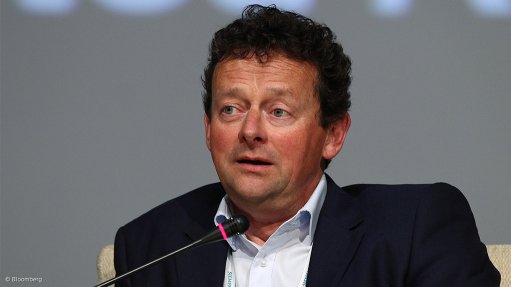
Glencore chairperson Tony Hayward
Photo by: Bloomberg
The oil industry should expect the current low oil price environment to continue for a number of months, with the market to take 18 to 30 months “to clear”.
Speaking to delegates at the Africa Oil Week, in Cape Town, on Tuesday, Glencore chairperson Tony Hayward outlined the tough times facing the oil industry, with the collapse in the oil price, sliced budgets and oversupply.
The oil industry had seen a supply side shock.
The rapid growth of shale production in the US over a three- to four-year period had “completely overwhelmed demand”, Hayward said.
He noted that Saudi Arabia had been faced with a stark decision a year ago, on whether or not to surrender market share to a high-cost producer. It took a “rational decision” not to cede market share, he added.
“Saudi Arabia did not cut production. It increased production. Iraq also increased its production.
“The Organisation of Petroleum Exporting Countries (Opec) increased production by 1.5-million barrels a day. Production in the US peaked in April and has been declining since the middle of the year, so the Saudi strategy is working,” he stated.
Hayward noted that low oil prices had stimulated demand, with the strongest ever demand recorded in 2014/15.
He expected some wildcards on the supply side, including from Iran and Libya, in future. He said Iran would re-enter the market by the first half next year, while Libya was putting 400 000 bl/d onto the market.
He said Libya had the potential to produce one-million barrels of oil a day and potentially higher, while Iran was expected to put 500 000 bl/d of oil into the market within a year.
Even without an oil price collapse, it was time for governments and industries to take stock, Hayward asserted.
“The next six to twelve months will be very challenging for many industrial participants and survival will be the name of the game.”
Hayward called on governments to be realistic in their demands, as well as flexible and efficient in their decision-making.
While painting a bleak picture, he said he expected a swift recovery. “A $50/bl oil price will not sustain the oil supply the world needs. When prices do recover, it is likely to be strong and fast. We are sowing the seeds for the next oil bull market.”
Meanwhile, speaking about prospects for Africa, he said that, even without an oil price collapse, the industry needed to ask itself some challenging questions as exploration on the continent had not been a great success.
“Vast amounts of money have been spent from Morocco to Namibia, and we have very little to show for it. Over 50 wells have been drilled . . . with, so far, very limited success. Success was also less than predicted a few years ago in Angola.
Companies operating offshore East Africa had been very successful in discovering very large volumes of gas, but the time period for commercialisation was uncertain.